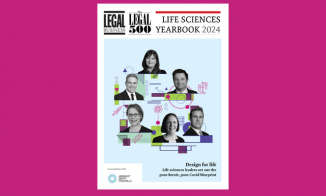Continue reading “Life Sciences Yearbook 2024 – Design for life”
Life Sciences Yearbook 2024 – online PDF
Please see below for a link to an online pdf of the Life Sciences Yearbook 2024.
Life Sciences Yearbook 2024 complete pdf link Continue reading “Life Sciences Yearbook 2024 – online PDF”
Life Sciences Yearbook 2024 – Editor’s letter
Welcome to the 2024 Life Sciences Yearbook from the Legal 500 and Legal Business, sponsored by Herbert Smith Freehills.
This yearly publication will offer insight into the issues facing life sciences companies in the wake of Brexit, as well as interviews with leading private practice lawyers in the sector and a data-driven snapshot of the top firms and practitioners from the Legal 500. Continue reading “Life Sciences Yearbook 2024 – Editor’s letter”
Life Sciences Yearbook 2024: Sponsored foreword – Herbert Smith Freehills
‘Economic and geopolitical pressures continued throughout 2023, making the global business landscape a volatile one. It might even be asked whether disruption is simply the new business norm.’
Global themes in 2023 and outlook
The disruption felt globally at the end of 2022 continued to impact life sciences companies and investors in 2023. Continue reading “Life Sciences Yearbook 2024: Sponsored foreword – Herbert Smith Freehills”
‘You’d be a brave innovator to ignore the UK’ – why patent work is booming in the post-Brexit UK life sciences market
Buzz about blockbuster drug developments, expiring patents and the launch of the European Union’s Unified Patent Court – 2023 certainly kept the life sciences sector on its toes.
Against a backdrop of several of the world’s best-selling drugs nearing their patent expiration dates and the market getting to grips with the implications of the long-awaited EU patent court, leading practitioners at UK law firms provide their perspective on the evolving world of IP and patent litigation in the life sciences sector – and what these changes mean for corporates and their in-house legal teams.
Continue reading “‘You’d be a brave innovator to ignore the UK’ – why patent work is booming in the post-Brexit UK life sciences market”
Lead partner: The year the United Kingdom becomes a globally leading life sciences hub?
As part of its ambition for the United Kingdom to become a tech and science superpower by 2030, in 2023, the government announced a range of initiatives aimed at boosting investment and innovation in the life sciences sector. Innovators will have welcomed the R&D tax relief reforms whilst the Mansion House Compact (the largest UK pension providers committing 5% of their assets to unlisted equities by 2030) announced in July has provided some hope of alternative pools of capital to unlisted UK life sciences companies.
Whilst the impact of those initiatives remains to be seen (and of course with a general election looming) the UK life sciences industry is being positioned to play an integral part in the growth of the country’s economy with many recent legal and regulatory developments also seeking to enhance the attractiveness of the UK as a leading life sciences hub. The UK’s offer to prospective investors will be centred around access to innovation, the financial firepower of the City, the introduction of progressive and pragmatic regulation and a robust advisory ecosystem, which it hopes will allow it to differentiate itself from the EU.
Continue reading “Lead partner: The year the United Kingdom becomes a globally leading life sciences hub?”
Taking back control – the post-pandemic landscape for life sciences regulation
After years of delays caused by geopolitical instability and the Covid-19 pandemic, the new regulatory landscape for the life sciences industry is beginning to take shape in both the UK and the EU.
As the UK pushes ahead with its post-Brexit journey of divergence, establishing itself as an innovation-friendly environment in the global life sciences market has become of paramount importance. In contrast, the EU’s attempts to draft comprehensive laws on AI have attracted criticism from the medical devices industry, prompting overburdened innovators to turn to more investment-friendly locations. Continue reading “Taking back control – the post-pandemic landscape for life sciences regulation”
Life Sciences perspectives: Grant Castle
Why did you decide to specialise in life sciences?
I have a science background – a PhD in organic chemistry – and worked for a short time as a medicinal chemist for Glaxo. I also had an interest in the humanities at school, so law had always seemed to be an option, and life sciences law made sense. I had assumed that I would go into IP/patents, but was lucky enough to meet a life sciences regulatory lawyer from Covington and spent some time there before my training contract. I came back to Covington on qualification and I am still here 25 years later. I clearly made the right choice. Continue reading “Life Sciences perspectives: Grant Castle”
The Legal 500 view: Healthy competition
The Legal 500’s life science and healthcare industry focus ranking was introduced three years ago to recognise firms with dedicated cross-practice teams advising high-profile clients across the sector. Continue reading “The Legal 500 view: Healthy competition”
Rising stars: Zina Chatzidimitriadou – ‘It is the one legal area that affects every single one of us and is, above all, human-centred’
Zina Chatzidimitriadou, senior managing associate at Sidley, on why she picked a career in life sciences law
Why did you decide to specialise in life sciences law?
In 2009, in my previous life as a molecular biologist at the Cancer Research UK institute, I experienced the multiple issues and complexities facing researchers and people involved in the development of life-saving treatments and methods. Life sciences emerged as the natural field of law for me and, while I am biased, I believe it is the most exciting field of law. Continue reading “Rising stars: Zina Chatzidimitriadou – ‘It is the one legal area that affects every single one of us and is, above all, human-centred’”















